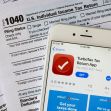The Federal Trade Commission recently voted to take a case against Intuit Inc. to trial rather than grant a summary decision against the financial software company. The enforcement action stems from allegations that the company falsely markets its TurboTax services as “free,” when in reality many customers end up with charges.
The FTC filed its original complaint against Intuit in March 2022. The agency alleges that the tech company’s advertisements for TurboTax repeatedly claim the tax preparation service is free. They constantly use the word “free” across all marketing channels, including television, websites, social media, and paid search advertising. The agency pointed to one TV commercial as an example, which relied on a gimmick in which almost every word spoken on screen was the word “free.”
In reality, the FTC claims, “TurboTax is free for only some consumers, based on the tax forms they need.” Most customers do not qualify for the free service because they require more than the simplest tax forms. Taxpayers with any specialized concerns--such as “property deductions, itemized deductions, unemployment income, education expenses, charitable donations of over $300, investment or rental property income, and expenses from self-owned businesses”--are not eligible for TurboTax’s “Free Edition.”
Drawn in by promises of free tax filing, customers start the TurboTax process, input “sensitive personal and financial information into TurboTax,” and are only then told they “will need to upgrade to a paid TurboTax service to complete and file their taxes.” The FTC alleges these so-called “door-opener” ads are unlawfully deceptive in violation of Section 5 of the FTC Act.
The enforcement action is proceeding through the administrative process, although the FTC’s efforts to get a temporary restraining order against Intuit were previously rejected by a federal court. In August 2022, the agency’s Bureau of Consumer Protection (BCP) filed a motion for an abbreviated or summary decision against Intuit based on the alleged deceptive practices. Summary decisions are appropriate when there are no genuine issues of material fact--that is, when all firmly established facts mandate a particular legal resolution.
FTC Commissioners voted to reject the motion, finding instead that the matter should be adjudicated fully before an FTC administrative law judge. The Commissioners found that, while some of the ads are clearly deceptive, many of Intuit’s ads will require a more nuanced analysis. It would not do to grant summary judgment on merely part of Intuit’s marketing campaign. Proceeding to “trial will provide a fuller factual record and facilitate a more complete and cohesive opinion that addresses all of the relevant legal and factual issues, and advertising claims at once.”
The FTC’s enforcement action is part of an ongoing battle between paid tax prep services and efforts to make tax filing simple and free. In most wealthy countries, the majority of citizens can file for free. In the U.S., efforts to make tax filing free and simple have been met with fierce, expensive lobbying efforts by Intuit and other tax prep service providers like FreeTaxUsa or H&R Block.
Unfortunately for the average citizen, the for-profit tax regime has held the advantage. In 2019, Congress passed a law that essentially forbade the IRS from providing its own free online tax filing service. So long as Intuit, H&R Block, and others provided a system for free tax filing for citizens under a certain income, the IRS was prohibited from providing its own tax filing portal. Despite participating in the “Free File” program, the for-profit tax prep companies deliberately guided customers away from the free services, rendering them all but unused.
Congress is now meant to be considering ways to make tax filing simpler for most citizens. Intuit and H&R Block have since withdrawn from the IRS’s Free File program, opening the door for the IRS to develop its own program. The Inflation Reduction Act, enacted in late 2022, provides the IRS with $15 million to study how it could implement a system to allow citizens to file their taxes for free. That $15 million pales in comparison to the $80 billion recently allocated to the IRS for the purposes of hiring more agents, updating old computer systems, and increasing audits on higher income-earners.






